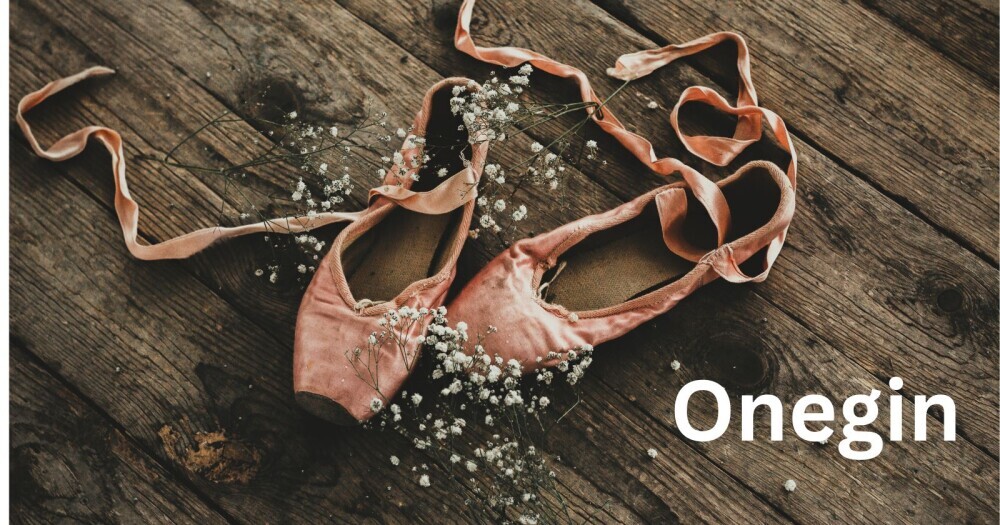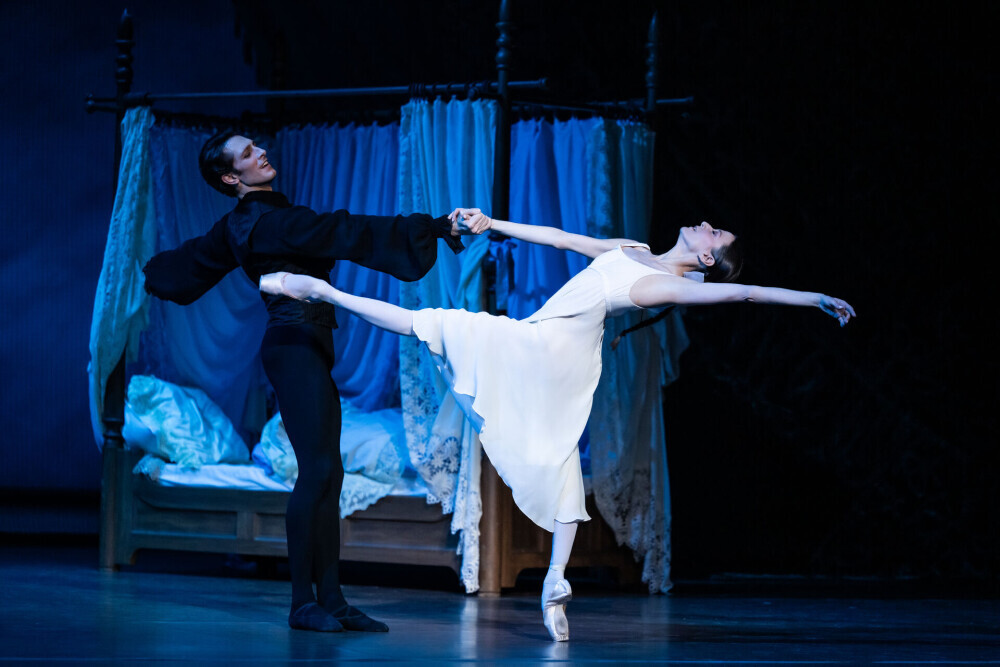The Onegin Ballet is in three acts.
The choreography was done by John Cranko and he also did the Libretto after the poet Pushkin.
The music was by Tchaikovsky which was selected and arranged by Kurt-Heinz Stolze.
The stage design was don by Jurgen Rose.
The first performance of the Onegin Ballet was done on the 13th of April 1965 by the Wurttemberg State Ballet in Stugart.
Marcia Haydée danced Tatiana, Ray Barra danced Onegin, Ana Cardus danced Olga and Egon Madsen danced Lensky.

Onegin Ballet Synopsis
Act 1:
Scene 1:
Mme Larina’s Garden.
Mme Larina, Olga and the nurse are sewing dresses and gossiping about Tatiana’s forthcoming birthday party.
Mme Larina remembers her own lost youth and beauty.
Girls arrive and play games, seeking to learn the future by gazing in a looking glass.
Lensky, a young poet engaged to Olga, arrives with his friend Onegin, who has left St Petersburg because of boredom.
Tatiana, a highly romantic girl, falls in love with this handsome stranger.
Onegin considers her only to be a coltish country girl who reads too many romantic novels.
Scene 2:
Tatiana’s bedroom.
Tatiana writes a letter to Onegin telling him of her love. In her imagination he appears to her and dances passionately with her.

Act 2:
Scene 1:
Tatiana’s birthday party.
Provincial society is enjoying the party, but Tatiana’s eyes seek out Onegin. He gives her the torn pieces of her letter to him, and he is further irritated by her distress at this action.
Prince Gremin, a distant relation of Tatiana’s, who is in love with her, pays court to Tatiana, but she hardly notices him.
Onegin, bored, starts to flirt with Olga, seeking to tease Lensky, but Lensky takes action as an insult, and challenges Onegin to a duel.
Scene 2:
The duel.
Tatiana and Olga try to persuade Lensky to pardon Onegin, but Lensky has been deeply hurt by his friend’s behavior and by Olga’s light-mindedness.
He insists on fighting, and is killed.
Onegin is horrified, and for the first time his emotions are touched.
Tatiana then realizes that he is entirely self-centered.
Act 3:
Scene 1:
A ball in Prince Gremin’s palace.
Years later Onegin returns to Petersburg after having travelled the world in an attempt to escape from the futility he senses within himself.
He arrives at a ball given by his friend Prince Gremin, and discovers that Gremin’s wife is Tatiana, now an elegant and beautiful woman. He realizes the great loss he suffered in rejecting Tatiana’s love years before, and determines to have an interview with her.
Scene 2:
Tatiana’s boudoir.
Tatiana is reading a letter from Onegin in which he declares his love for her. Onegin arrives, and eagerly demands to know if she loves him. Tatiana rejects him and he leaves.
Onegin is a tribute to the extreme emotional richness of Pushkin’s poem, to Tchaikovsky’s operatic version of it.
Cranko’s score is arranged by Stolze from other Tchaikovsky music, and also to the superb lyric/dramatic gifts of his Muse, Marcia Haydée.
In four full-length ballets – Romeo and Juliet, Taming of the Shrew, Onegin and Carmen, Cranko produced four different and highly theatrical roles for this magnificent ballerina, whose career was so intimately linked with the development of the Stuttgart ballet and with Cranko’s choreographic achievements.
Onegin is a really skilled realization of the Pushkin drama, losing nothing in intensity for all that it features big danced set-pieces in each act.
Cranko maintains an intimacy in dealing with Tatiana’s girlish emotions which somehow preserves the youthful bloom.
In the last act when Tatiana has become a beautiful and elegant women, the reversal of Oregon’s earlier rejection of her, is still managed in a closely focused scene.
The choreography, indeed, offers a vivid contrast of pas de deus – a final duet between Onegin and Tatiana is one of Cranko’s finest creations with larger set pieces which make excellent use of social dance ideas in the parties which feature in each act.
With his full-length ballet Onegin, John Cranko secured his place in the pantheon of great 20th century choreographers.
Here is a shortened version of the ballet. On the occasion of its 50th anniversary the Stuttgarter Ballett has come up with a special cast featuring Alicia Amatriain as Tatjana, Friedemann Vogel as Onegin, Elisa Badenes as Olga, David Moore as Lenski, Jason Reilly as Prince Gremin, Melinda Witham as Madame Larina and no other than the wonderful Marcia Haydée as nurse.

John Cranko’s adaptation of Pushkin’s Onegin is truly a masterclass in storytelling through dance. This article beautifully captures how Cranko, with the evocative power of Tchaikovsky’s music, managed to translate the emotional and psychological complexity of the original text into a compelling ballet. It’s fascinating to see how narrative ballet can so vividly convey inner turmoil and character evolution without a single spoken word.
What a beautifully concise yet informative overview of Onegin! John Cranko’s adaptation of Pushkin’s work is such a powerful blend of literature and dance, and I love how you highlighted the creative team behind it—especially Kurt-Heinz Stolze’s musical arrangement and Jürgen Rose’s stage design. It’s amazing how this ballet continues to resonate decades after its 1965 premiere.
Thanks for sharing this slice of ballet history—it’s always a joy to learn more about the classics!
Watching the Onegin ballet really touches me. It’s more than just beautiful dance — it’s about choices, regret, and the quiet pain of lost chances. As a Russian-speaking person, I connect deeply with the emotions and mood it shows. It reminds me how feelings can be complex and often unspoken, but art like this helps us understand and feel them better. Truly moving.